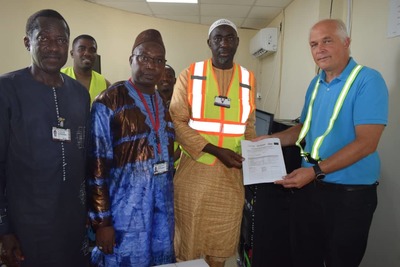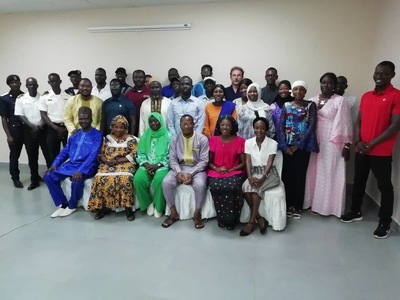50,000 rural dwellers to benefit from solar-powered water supply

James F. Gomez, minister of Fisheries, Water Resources and National Assembly Matters, while answering questions in a recent face-off in parliament, disclosed that it has been estimated that 50,000 of the rural population will benefit directly from 20 solar-powered water supply systems.
He disclosed that the project came through the Department of Water Resources under his Ministry and secured from the Government of Japan through the Japan International Cooperation Agency (JIVA).
The project, he noted is in line with their quest to achieve universal and equitable access to safe and affordable drinking water, a goal of the National Development Plan 2018-2021. “The 20 solar-powered facilities will provide sustainable supply of safe and quality drinking water in the rural areas”.
The minister further disclosed that his ministry through the Department of Water Resources is currently implementing two projects namely: Climate Smart Rural WASH Development (CSRWASH), funded by African Development Bank Group (AFDB); and the Saudi Sahel Project Phase V (SSP V), funded by the Saudi Fund, meant to provide access to safe and quality drinking water to the communities including a solar-powered water supply system to the community of Baraji Kunda.
In response to a question about the Senegalo-Gambian Fisheries Agreement, Minister Gomez explained: "It started since the First Republic and was ratified by parliament during that era; subsequent years only witnessed reviews and renewals of its governing protocols. In December, 2014, The Gambia unilaterally revoked it without proper procedure until in March 2017 when it was restored before the National Assembly elections in that year”.
James F. Gomez, minister of Fisheries, Water Resources and National Assembly Matters, while answering questions in a recent face-off in parliament, disclosed that it has been estimated that 50,000 of the rural population will benefit directly from 20 solar-powered water supply systems.
He disclosed that the project came through the Department of Water Resources under his Ministry and secured from the Government of Japan through the Japan International Cooperation Agency (JIVA).
The project, he noted is in line with their quest to achieve universal and equitable access to safe and affordable drinking water, a goal of the National Development Plan 2018-2021. “The 20 solar-powered facilities will provide sustainable supply of safe and quality drinking water in the rural areas”.
The minister further disclosed that his ministry through the Department of Water Resources is currently implementing two projects namely: Climate Smart Rural WASH Development (CSRWASH), funded by African Development Bank Group (AFDB); and the Saudi Sahel Project Phase V (SSP V), funded by the Saudi Fund, meant to provide access to safe and quality drinking water to the communities including a solar-powered water supply system to the community of Baraji Kunda.
In response to a question about the Senegalo-Gambian Fisheries Agreement, Minister Gomez explained: "It started since the First Republic and was ratified by parliament during that era; subsequent years only witnessed reviews and renewals of its governing protocols. In December, 2014, The Gambia unilaterally revoked it without proper procedure until in March 2017 when it was restored before the National Assembly elections in that year”.


